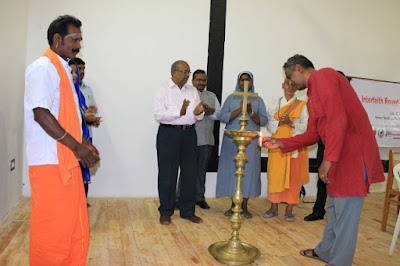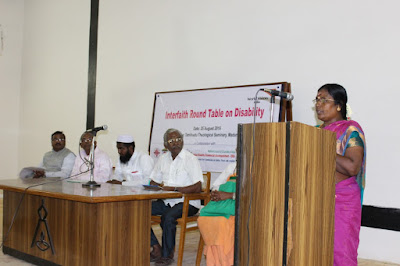Report of the Interfaith Round Table on Disability held on 25th August 2016 at Tamilnadu Theological Seminary
 The National Council of Churches in India – Indian Disability Ecumenical Accompaniment (NCCI – IDEA) and World Vision India joined the Tamilnadu Theological Seminary, Tamilnadu Christian Council, Engage Disability, Christian Service Agency, Church of South India – Diocese of Madurai–Ramnad and the Madurai Interfaith Initiative in organizing an ‘Interfaith Round Table on Disability’ on 25th August 2016 at Tamilnadu Theological Seminary, Madurai on the theme “Faith Journey Together Towards Inclusive Communities’.
The National Council of Churches in India – Indian Disability Ecumenical Accompaniment (NCCI – IDEA) and World Vision India joined the Tamilnadu Theological Seminary, Tamilnadu Christian Council, Engage Disability, Christian Service Agency, Church of South India – Diocese of Madurai–Ramnad and the Madurai Interfaith Initiative in organizing an ‘Interfaith Round Table on Disability’ on 25th August 2016 at Tamilnadu Theological Seminary, Madurai on the theme “Faith Journey Together Towards Inclusive Communities’.
70 faith practitioners from different faith backgrounds including clerics, lay leaders, students of theology, philosophy, secular studies, research scholars, theological and secular educators, social and development workers and representatives from different interfaith initiatives participated in this round table representing the major faiths including Buddhism, Christianity, Hinduism, Islam, Dalit, Folk and also Secular Ideologies.
The round table started with a Buddhist prayer by monks. Rev. Dr. Kanagu Nelson welcomed the gathering. The Coordinators shared greetings from Rt. Rev. Dr. M Joseph, Bishop CSI Diocese of Madurai – Ramnad and Dr. Esther
Kathiroli, Secretary Tamilnadu Chris tian Council. Rev. Dr. David Rajendran, Principal, Tamilnadu Theological Seminary, inaugurated the Round Table by joining different faith representatives in lighting the ‘kuthu vilakku’. Rev. R. Christopher Rajkumar (NCCI) and Dr. Christopher Baskaran (World Vision India) shared
tian Council. Rev. Dr. David Rajendran, Principal, Tamilnadu Theological Seminary, inaugurated the Round Table by joining different faith representatives in lighting the ‘kuthu vilakku’. Rev. R. Christopher Rajkumar (NCCI) and Dr. Christopher Baskaran (World Vision India) shared
greetings from NCCI and World Vision and introduced the round table.
Rev. Dr. David Rajendran, in his inaugural address informed the participants that the entire Christian world is getting ready to commemorate 500 years of Martin Luther’s Reformation in 2017. 500 years ago the ‘reformation movement’ questioned and countered the oppressive and discriminating faith practices of that time and the reformation helped the adherents to get away from oppressive components in their faith journey. He further called upon the faith communities to work towards reformation in contemporary times in order to promote and uphold inclusive society through our spiritualties, faith expressions and religious practices, and to completely eliminate and eradicate oppressive and discriminating practices in our societies by expanding the inclusive realm to all the religiously, socially, culturally and historically excluded communities including ‘People with Disabilities’ (PWDs).

Ven. Bikkuni Leelavathi, Janab Ahamad Siddique, Rev. Sr. Regina Mary, and Shri. Thangaraj served as panelists reflecting on the theme, ‘What does my faith say about People with Disability’. Rev. Christopher Rajkumar and Rev. Dr. Kanagu Nelson jointly moderated the panel.
Ven. Bikkuni Leelavathi, a Buddhist Monk, informed the participants that according to Buddhism, malnutrition, undernourishment, and hunger are the main causes for any disability. The narrative of Manimekala calls all of us to collect food and feed every one who is in need, to eradicate not only hunger but also to establish a healthy society where there would be no possibility for the birth of PWDs in our world. She further emphasized that instead of looking for a meaning for disability, let us look for reasons that cause disability and address the issue to create a world without persons with disabilities by healthy feeding programmes as an expression of our faith response.
Janab Ahamad Siddique, an Islamic theologian cited from Quran that Allah the Almighty, never discriminates any persons with disabilities. In fact  during Prophet Muhammad’s time, the disabled were used by the religious leaders to invite the Muslim believers to prayer at the mosques, noteworthy being the the visually impaired person who offered invitation at the mosque in Mecca. Further he said, on Judgment Day, visually impaired persons would go directly to heaven since, they would be found to be sinless in the world. He also further asserted that the Quran treats all as equals, without any discrimination and stigma; all are considered as children of God.
during Prophet Muhammad’s time, the disabled were used by the religious leaders to invite the Muslim believers to prayer at the mosques, noteworthy being the the visually impaired person who offered invitation at the mosque in Mecca. Further he said, on Judgment Day, visually impaired persons would go directly to heaven since, they would be found to be sinless in the world. He also further asserted that the Quran treats all as equals, without any discrimination and stigma; all are considered as children of God.
Rev. Sr. Regina Mary a Christian caregiver, pointed out that the God of the Bible used a PWD named Moses to liberate people who were under political oppression. Also God ordained PWDs to be prophets who reformed society when people went wrong, e.g. Jeremiah. Further she stated that Jesus Christ was working towards bringing in a society where there would be no discrimination on the basis of physical and mental disabilities; therefore Jesus healed PWDs during his ministry. She also asserted that Christianity considers that all are created in God’s image, including PWDs.
Shri Thangaraj, a Hindu faith practitioner, stated that according to Hinduism, deformity is based on the Karma of persons in their previous lives; however at the same time the karma of other persons in their past lives leads them to take care of the disabled in this life. So disability or deformity should not be seen or considered as a curse or punishment of God; rather such deformities facilitate other adherents in being more responsible and accountable for those who are in need, thereby representing God in the lives of the PWDs.
Two faith practitioners responded to this panel. Mr. Devaraj, educationist and Tamil Scholar responded by asserting that all scriptures and faiths affirm the life, respect and dignity of PWDs; however the holy shrines should facilitate their inclusion with needed inclusive conscious infrastructure and literature since every PWD has a right to worship. The PWDs are allowed to take part in the very life of the worshiping communities including their leadership.
Shrimathi Pandeeswary, a follower of ‘Sanmarga Shabai’ observed that the religious leaders and scholars like Kalidas, and Valmiki were PWDs and God used them to edify the adherents spiritually through their literary skills. Why do not we accept the leadership of PWDs today in our religious lives? If we continue to do so, we would be against our gods and faiths. Therefore, we need to accept every one as they are and promote inclusiveness.
Dr. Christopher Baskaran, the Deputy Director, Church Relations and Interfaith Relations of World Vision India initiated a group discussion after introducing different types of disability and explaining what inclusivity means. The participants were divided into six groups and asked to identify the barriers that discriminate PWDs from the society and the factors that would promote their inclusion. This method was found to be effective as it led the participants to have deeper and meaningful discussions and brought several possible suggestions including inculcating a culture of inclusivity in the society and promoting consciousness about the need for disabled-friendly infrastructures in public buildings and holy shrines.
Rev. Dr. Kanagu Nelson, Professor and Head Department of Religious Studies of the Tamilnadu Theological Seminary in his concluding remarks said that we as faith communities need to be more conscious about using derogatory, abusive and disrespectful language that discriminates against PWDs in our day to day life. When God uses words of love, why should we use disrespectful or hate language?
Rev. R. Christopher Rajkumar, Executive Secretary, Commission on Mission: Ecumenism: Theologies of Life and Director of the Indian Disability Ecumenical Accompaniment (IDEA) Forum, in his closing remarks referred to ‘Divine Miracles and Divine Healings’ of the PWDs found in our scriptures. According to him, these divine acts not only made PWDs normal but also the entire society was made inclusive. Therefore, we as faith communities need to work for a community where the people who live on the margins of society come to be part of the society. So, let us as a community that represents God, become the agents of change and transformation where all are together as God’s communities.
Mrs. Devaki of Madurai Interfaith Initiative proposed the vote of thanks and the participants sang the National Anthem in unison as a closing act. Rev. Dr. V. Kanagu Nelson, Mrs. Devaki, Mr. Jacob Devabhaktula and Ms. Cynthia Shinde co-ordinated the Round Table.
The Madurai Interfaith Round Table is the Tamilnadu regional expression of the national interfaith conversation on disability in order to promote NCCI’s quadrennial theme ‘Towards Just and Inclusive Communities’ and its national campaign on ‘Accessible and Inclusive Holy Shrines’.

Reported by:
Mrs. Cynthia Shinde
Coordinator,
NCCI – Indian Disability Ecumenical Accompaniment
ncci.idea@gmail.com

 The Most Rev. P.K. Samantaroy, Moderator, CNI presided over the meeting. Rev. Dr. Paul Swarup, CNI reflected on the history of Reformation, Martin Luther’s role and its relevance in today’s world. Rev. Markus Lesinski, EKD, deliberated over 12 points on the impacts and challenges of the Global Reformation Celebration. Over 22 people from various churches and Christian organizations attended the meeting.
The Most Rev. P.K. Samantaroy, Moderator, CNI presided over the meeting. Rev. Dr. Paul Swarup, CNI reflected on the history of Reformation, Martin Luther’s role and its relevance in today’s world. Rev. Markus Lesinski, EKD, deliberated over 12 points on the impacts and challenges of the Global Reformation Celebration. Over 22 people from various churches and Christian organizations attended the meeting.
 Respected Ecumenical Colleagues,
Respected Ecumenical Colleagues,
 Tribal and Adivasi Sunday was celebrated at MBC Bible College, Hyderabad on 7th of August 2016. It was an enlightening evening, the whole community gathered at the academic centre to participate and celebrate through this worship.
Tribal and Adivasi Sunday was celebrated at MBC Bible College, Hyderabad on 7th of August 2016. It was an enlightening evening, the whole community gathered at the academic centre to participate and celebrate through this worship. Each year, the International Day of Peace is observed around the world on 21st September. The General Assembly of the United Nations has declared this as a day devoted to strengthening the ideals to inculcate the culture of Peace, both within and among all nations and peoples.
Each year, the International Day of Peace is observed around the world on 21st September. The General Assembly of the United Nations has declared this as a day devoted to strengthening the ideals to inculcate the culture of Peace, both within and among all nations and peoples. Rev. Dr. Hmingthansanga, General Secretary of All India Sunday School Association preached at All Saints Cathedral CNI Church on Luke 10. In his sermon he emphatically asked “Who is my neighbour?’’ and highlighted the problems faced by Tribal, Adivasis and Dalits in today’s context.
Rev. Dr. Hmingthansanga, General Secretary of All India Sunday School Association preached at All Saints Cathedral CNI Church on Luke 10. In his sermon he emphatically asked “Who is my neighbour?’’ and highlighted the problems faced by Tribal, Adivasis and Dalits in today’s context.